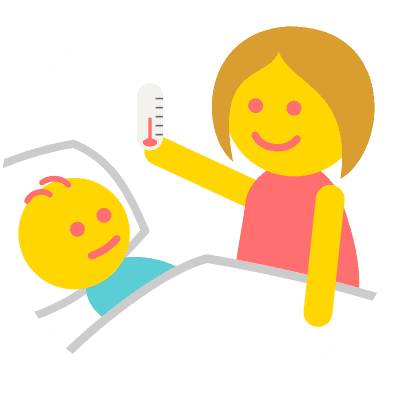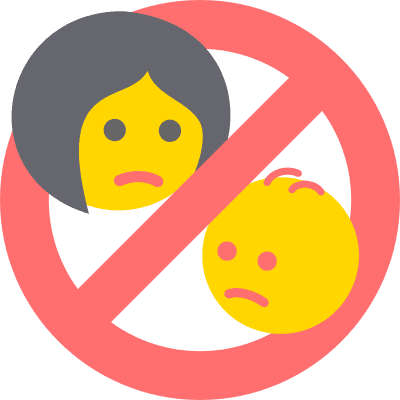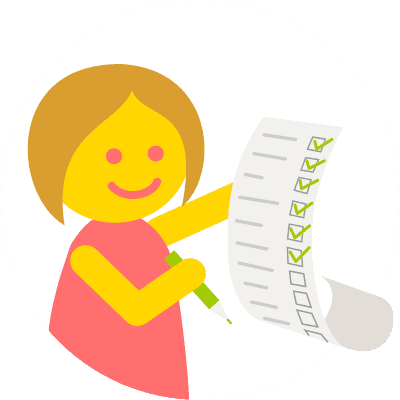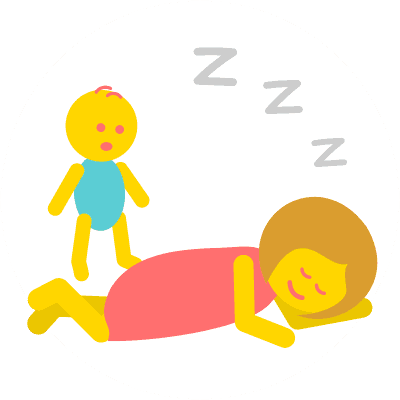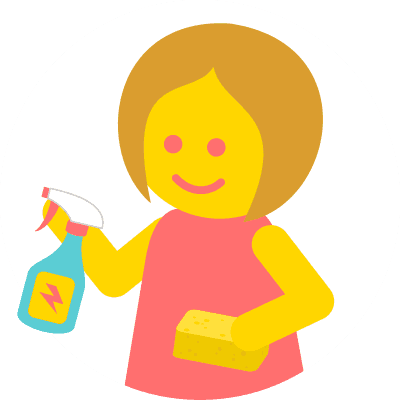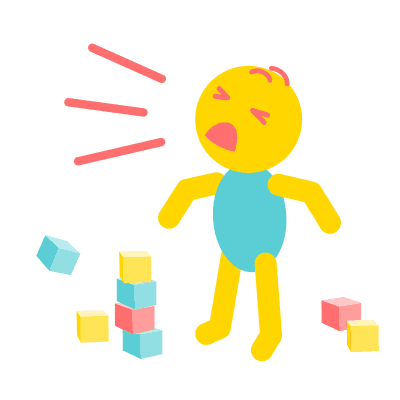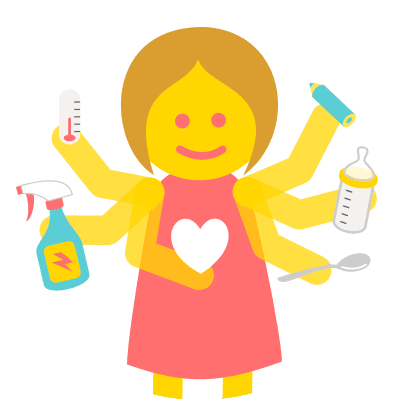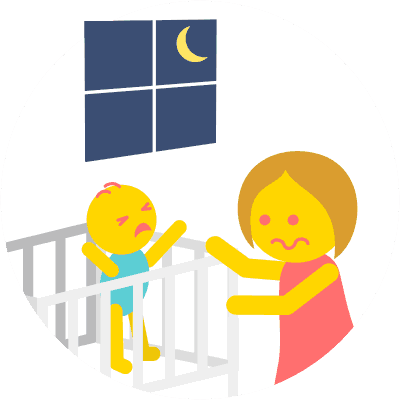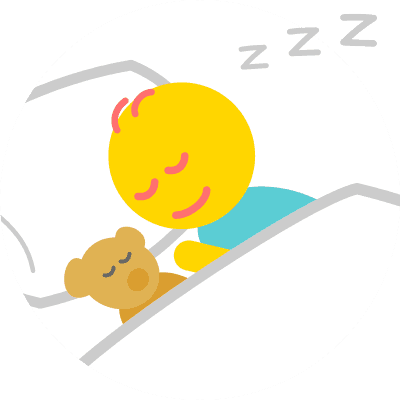Should you Babysit when Sick? (How to Manage Parent Expectations + Video)
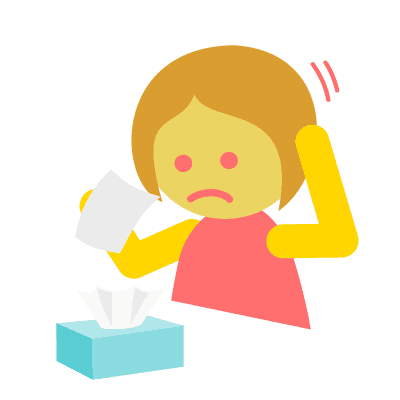

Written & Illustrated by
Matthew James Taylor
Kidsit Founder, General Manager

Babysitting Video by
Lydia Kutz
Babysitter, Infant Swimming Resources Instructor

Medically Reviewed by
Gina Maria Jansheski, MD, FAAP
Board-Certified Pediatrician, Medical Reviewer
Key Takeaways
- Don’t work when contagious: If you're sick with symptoms like fever, vomiting, or persistent coughing, it's best to stay home. Working while ill can prolong your recovery and risk spreading illness to children and parents.
- Set clear expectations: Discuss illness policies with parents before accepting jobs. Include guidelines in your babysitting contract about when you’ll call in sick and any paid sick leave.
- Protect your health: If you’re already sick, working can delay your recovery. Caring for children while unwell can be exhausting and may lead to more severe illness.
- Communication is key: Be honest with parents about your health. If you're unwell, let them know as early as possible so they can make alternative arrangements.
Everyone gets sick. This is true, especially for babysitters. More times than not, babysitters get sick from the kids they are caring for. Catching the flu can also come from the mom or dad who has that dreaded stomach flu and stays home from work.
Should you babysit when you are sick? If a babysitter feels too sick to work, they should make arrangements to stay home. Working while sick is not only an issue for the babysitter, but also for the family. There’s a good chance that a contagious person will make everyone else sick, too. All of these expectations should be set during the hiring process.
What are the risks of going to work sick? What specific things should be in a babysitting contract when it comes to calling out for an illness? How sick is too sick to work? What’s the general expectation of babysitters when it comes to calling out last minute? Let’s get into these questions in detail.
Lydia has been working in the childcare industry for 15 years, and owned a childcare agency in Florida, USA for 7 years. She has dealt with sick kids and herself being sick on numerous occasions, in this video she talks about the dos and don'ts of babysitting when you or the kids are sick.
What are the Risks of Going to Work Sick?
Most babysitters hate to cancel because they know that the parents are counting on them. Many parents are working, have meetings to attend, errands to run, and appointments to go to. When you call in sick at the last minute, it’s really frustrating and inconvenient for them, to say the least.
Going to work sick might have short-term benefits but long-term consequences. It’s wonderful to be known as the sitter who never calls in sick, but if you are contagious and pass your sickness to the children, the parents will likely get it too. And if it’s something severe like the stomach flu, it will likely even cause parents to miss work.
Another point to consider is if you go to work when you are ill, there’s a good chance that it will take much longer for you to recover. It’s hard work when you’re sick and trying to care for little kids. Your body needs rest to get better.
The best thing to do is to have an open conversation ahead of time with the parents about their expectations, and yours, regarding working while sick. Whatever you decide together, it is important to make sure that the details are written into your babysitting contract.
What Guidelines for Illness Should be Included in a Babysitting Contract?
A babysitting contract is a great way to protect both the parents and the sitter. It’ll allow you both to be on the same page and prevent misunderstandings by documenting your agreement.
So, what should be added under sickness in the contract?
- Under what circumstances will the sitter not be allowed to watch the child? (An example would be if the sitter has a fever, or is vomiting, sneezing, or coughing uncontrollably.)
- If the sitter comes in sick, are they expected to perform the same duties?
- Will the sitter get any paid sick days?
- Under what circumstances would the sitter take care of the kids when they are ill, and what expectations do the parents have regarding the care that is needed (e.g., taking them to doctor’s appointments, giving medicine)?
- Do the parents require the sitter to have certain vaccinations?
Although parents rely on you to be able to work, the reality is that you will get sick from time to time. You should think about what you are willing and able to do when you are really ill. If having the flu automatically means that you won’t come to work, be honest, and tell the parent. Make sure that these details are in the contract.
What if you are taking care of the kids while they have the flu? (See our tips for babysitting sick kids). Or if the mom or dad have you come in while they stay home from work because they have the stomach flu? Then a couple of days later, you get the same virus? Paid sick days might be something that becomes important to you.
It can be really unfair if the family you’re regularly sitting for makes you sick and offers no compensation, specifically for long-term contracts. If you miss several days of work and aren’t paid, this will put an unnecessary financial strain on you.
How Do You Know if You are Too Sick to Work?
Waking up in the morning with vomiting or fever is a very tough thing to handle, but when you feel that bad, at least it is pretty clear that you won’t be able to go in to babysit that day.
When your symptoms are changing over time, and it’s not so clear-cut, how will you know whether to tough it out and take care of others, or call in sick to take care of yourself?
Here are a few guidelines that you should try to keep in mind and plan to discuss with the parents of the kids you babysit:
- Fever is a sure sign that you are not well enough to take care of others. You might feel feverish, but that can come and go, and you cannot really be sure unless you take your temperature. A measured temperature of 100℉ (37.8℃) is considered the cut-off for a fever. Most employers recommend staying at home until at least 24 hours since the last elevated temperature (and that is without fever-reducing medications.)
- Cold symptoms, such as a new onset low-grade fever, chills, runny nose, sneezing, cough, and scratchy throat, can signal an upper respiratory infection. The flu will begin in a similar manner, but the symptoms are much more debilitating. There will generally be a more rapid onset and a higher fever, along with muscle aches, and a greater overall feeling of weakness and fatigue. This type of viral infection is most contagious at the beginning. And, even though it may take a week or more for the illness to go away completely, the first few days are very often when you feel your worst.
- Vomiting or diarrhea can begin without warning, and it usually does not permit anything other than a spot near the bed and the restroom. Even when the vomiting stops and you start to improve, if you can’t eat or drink normally, you’d best stay at home and take care of yourself.
- Migraine headaches can be quite disabling for people, and they need to simply retire to a dark room to sleep them off. Other recurring conditions, such as backache, colitis, or chronic pain, can really make an impact. When you have to take pain medication, you may not be able to drive, think normally, or concentrate on the things that need to be accomplished in any workplace. In these cases, it is important to be clear with yourself about how well you can function when these symptoms hit, what medication you may need to take for them, and how both of those may affect your ability to care for others.
When you are sick, your first priority is to take care of yourself. Your body will need rest and time before you can take on the demands and responsibilities of the work environment. So even though you don’t want to let anyone down, it is important to strongly consider how your symptoms will affect those that depend upon you, whether you are contagious or not.
If you are just getting over a contagious illness and you decide it’s time to return to work, remember that you may still have some virus hanging out in your body that can be spread by coughing, sneezing, and your lingering runny nose. So make sure to practice excellent personal hygiene beginning with handwashing, coughing into your elbow (yes, not your hand because that is what you touch everything with), and minimizing physical contact — all for the protection of any little ones in your care. (source)(source)
Should Your Duties Change if you Go to Work Sick?
If you have a headache, allergies, or something that isn’t contagious, and you do decide to go into work, then nothing should change. Take some acetaminophen (Paracetamol) or allergy medicine and continue with your normal routine.
But if you are at work with resolving symptoms of the flu, bronchitis, or some other illness that has really got you down, then the usual routine should be thrown out the window for a time. Ideally, this should have been addressed in the contract.
If not, tell the parents on the phone that you are sick, but you are willing and doing well enough to come to work. Let them know, however, that you can’t run around with the kids and do what you normally do. A movie day or other mindless activities will be more realistic to replace the busy schedule.
Most parents will be fine with that exchange if they are willing to have a sick babysitter care for their kid.
When you are at work, try to keep your germs to yourself as much as possible. Frequent hand washing, not leaving dirty tissues on the table or floor, and general hygiene practices should be followed. (source)
Here’s a list of symptoms that can help you decide if you’re contagious and at risk of infecting the kids: (source)
- Fever
- Vomiting
- Diarrhea
- Sore throat
- Fatigue
- Muscle aches
- Runny nose
- Sneezing
- Coughing
Once I started getting a sinus infection while I was babysitting for two girls who understood what it felt like to be sick, who got the concept that when you are sick you don't want to be up running around playing tag or doing energy draining activities, so we played low key activities and games like card games, video games, and watched a movie, they were very understanding. I didn't have much longer to babysit for them so I stuck it out. I kept my distance from them, I washed my hands if I was dealing with their food or anything. Everything was fine.
However, if I am working with a child who is younger who needs my attention who needs my support and I'm falling sick I usually text the parents and let them know 'Hey, something's come over me, here's what's going on, I really just don't think it's safe that i'm watching your child because I can't give them my full attention because I'm not feeling good'. Sometimes when we're sick we're not in the right headspace and that can be dangerous if you're watching a child.

Babysitter, Infant Swimming Resources Instructor
St Petersburg, Florida, United States
Whose Responsibility is it to Find a Babysitter Replacement?
The parents are the employers, and the babysitter is the employee or contractor. As the employer, the parents have the responsibility to find alternate care for their children. Babysitters are not superheroes who are infallible to illness. If, from time to time, you’re too sick to go to work, the parents should already have a backup in mind.
Although it’s not expected that you find a replacement if you are sick and can’t make it to work, it sure would be amazing if you had a friend to cover for you. The parents might be really appreciative, especially if they have already met this person. If you all plan this together in advance, and they have a chance to get to know your potential backup sitter, you may score huge points for being reliable, professional, and valuable.
The decision to babysit while sick is something that needs to be considered carefully. You, as the sitter, have to know what you are willing to do and then advocate for yourself. Certain days of your illness you will feel better than others. The parents also need to be aware that finding a replacement is their responsibility.
Being a reliable babysitter is absolutely necessary. But you should not feel guilty about canceling from time to time if you’re too sick to get out of bed. That would definitely be the responsible thing to do. Make sure to let the parents know at the earliest opportunity when you find that you are developing ill symptoms. At the same time, many babysitters have found it to be pretty easy to find a friend who is willing to help out for a day. This could be a win-win for everyone.
Related Questions:
Is babysitting an easy job?
Babysitting can be an easy job if the timing is such that you only have to watch a sleeping child. But most babysitters find that it is somewhere in the middle, not easy but not too hard. A lot depends on the number of children you have to watch, their ages, their behavior, and your experience with kids.
Read our article Is babysitting an easy job? for more information and handy hints to make your work easier.
Should babysitters clean?
When babysitters are hired to care for children, they should clean up any messes made while they are with the kids. Throughout the day, you will be feeding them, doing crafts with them, and playing with them. All of these activities leave behind a mess. Cleaning up after the kids, and supervising their own cleanup (depending on their ages), while you are being paid is part of your routine responsibilities.
Learn how to set parent expectations about cleaning in the home by reading our article Should babysitters clean?
How can I be a safe babysitter?
To be a safe babysitter, you need to be knowledgeable of basic first aid and the potential dangers kids often find themselves in. When watching young children, you need to always be aware of where they are and what they are doing. It’s recommended to discuss any possible risks, such as food allergies, and exchange emergency phone numbers with the parents ahead of time.
Read our article on How to be a safe babysitter to learn essential safety tips for on the job.
Career babysitters may even consider getting nanny insurance, see our article: Do babysitters need insurance? to learn if this is right for you.
